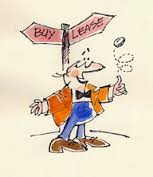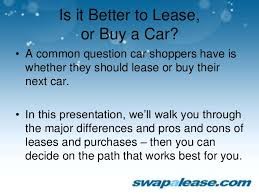Which is better?
Lease vs. Buy
Automobiles, Trucks, Vans and SUVs can be purchased for business use with cash or with a loan . Alternatively, the vehicle can be leased for several years at which time the possession goes back to the lessor. Often, at the end of the lease term, there is an option to buy.
Potential 2017 changes: Early drafts to upcoming changes say that a higher “capital percentage” may be beneficial for certain trades or businesses. Therefore, it may be beneficial to purchase such equipment, rather than lease it. When the final tax law is passed and IRS regulations are issued, this will be clearer.
Cost to buy:
 Down payment (or paid in full).
Down payment (or paid in full).- First monthly loan payment.
- Sales tax, Property tax and other taxes.
- Motor vehicle fees and lender fees.
- Vehicle Insurance and other services.
- Monthly loan payments, which generally are higher than lease payments.
Cost to lease:
- Capitalized cost reduction.
- Property tax and other taxes.
- Motor vehicle fees and lessor fees.
- Vehicle Insurance and other services.
- Gap insurance (which covers the shortfall due to the lessor, in the event of a total loss)
- Security deposit.
- Excess mileage charge and excessive wear costs when the vehicle is turned in at the end of the term.
- Monthly lease payments, which generally are lower than lease payments.
- In some jurisdictions, the full monthly lease payment (including the imputed interest charge) is subject to sales tax.
 swap-a-lease or other similar costs to exit the lease early or, alternatively, to enter into a lease from someone looking to exit their lease early.
swap-a-lease or other similar costs to exit the lease early or, alternatively, to enter into a lease from someone looking to exit their lease early.
When buying might be better:
- You want the have the vehicle for more than five or six years.
- You need to drive more then 15,000 miles per year.
- You need to drive less then 5,000 miles per year.
- You want quicker income tax deductions for vehicles subject to 50% or 100% bonus depreciation or a Section 179 write-off. (note that the Section 179 benefit might be recaptured if business use declines within 5 years)
- ○ Section 179 available for passenger automobiles with unloaded gross vehicle weight over 6,000 lbs and over 50% business use.
- ○ Section 179 available for trucks, vans, minivans and SUVs built on a truck chassis with loaded gross vehicle weight over 6,000 lbs and over 50% business use, pursuant to Rev. Proc. 2004.20, Section 2.
- ○ Section 179 available for trucks, vans, minivans and SUVs per the manufacture’s classification (rather than looking to see if it is built on a truck chassis) with loaded gross vehicle weight over 6,000 lbs and over 50% business use, pursuant to Chief Counsel Advice Memorandum CCA 201138046.
- ○ Section 179 available for vehicles other than passenger automobiles, trucks, vans, minivans and SUVs. Such as: some delivery trucks, moving vans, buses and vehicles with loaded gross vehicle weight over 14,000 lbs.
- To take advantage of any special manf. or dealer or gov’t rebates, incentives or tax credits.
- Flexibility to make changes if your needs change in the next three years.
- Keeping the transaction less complicated.
- Being able to subjecting the vehicle to rough usage, without having to worry about excessive wear fees.
- Not being required to turn the vehicle in, at what might be an inopportune time for your circumstances.
- Easier to get approval if you have a low credit rating.
When leasing might be better
- Leasing generally calls for a lower monthly payment amount, freeing up cash flow to be used for other purposes.
- You want the have the vehicle for less than three or four years.
- You want potentially higher income tax deductions for passenger vehicles that are not subject to 50% or 100% bonus depreciation or a Section 179 write-off.
- ○ But partially offsetting the potentially higher income tax deduction is a leased vehicle inclusion amount.
- To take advantage of any special manf. or dealer leasing incentives.
- You need to minimize up-front cash paid.
- Maximize monthly cash flow.
- Driving a more costly vehicle, than you could otherwise afford to buy.
- Not having to deal with selling or otherwise disposing of the vehicle after several years.
- Avoiding being upside down with a vehicle that has loss value, lower than the outstanding loan balance.
- During the last third of the lease term the dealer might be able to work a deal that puts you in a replacement vehicle sooner and on better terms.
Auto and vehicle tables
Capital Lease
A lease must pass one of these four tests to qualify as a capital lease:
-
- the term of the lease must exceed 75 percent of the life of the equipment leased;
- at the end of the lease, there must be a transfer of ownership to the lessee;
- over the life of the lease, the payments made must exceed 90 percent of the fair market value of the equipment;
- the lessor must include a bargain purchase price as a condition of the lease.
Operating Lease
An operating lease has no transfer of ownership involved, and over the course of the lease, the terms do not meet the qualifications of a capital lease, or the company leasing the property determines up front that it has no intentions of taking advantage of the full contract, in the event the lease does qualify as a capital lease.
Tax effects when you stop using a purchased vehicle:
- If an owned vehicle is traded-in on a replacement purchase then:
- ○ sales tax might be offset (reduced) and
- ○ any gain or loss is deferred.
- If an owned vehicle is traded-in on a replacement lease then:
- ○ there generally is no sales tax offset and
- ○ any gain or loss is recognized treating the trade-in value as the sales price and
- ○ a tax deduction for the amount of the trade-in value is amortized over the term of the lease.
- If an owned vehicle is sold outright to an unrelated party then:
- ○ there is no sales tax offset and
- ○ any gain or loss is recognized.
- If an owned vehicle is removed from business use and is retained for use by a related party then:
- ○ there may or may not be a sales tax issue and
- ○ any gain is recognized as ordinary income or short-term capital gain based on the difference between FMV and tax basis (book value) but
- ○ losses, generally are not deductible.
- If an owned vehicle is stolen, junked or destroyed then:
- ○ there is no sales tax offset and
- ○ any loss is recognized (after factoring in any insurance proceeds) and
- ○ any applicable property tax may be eliminated.
